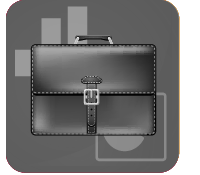Telling the time in French
Today we are learning how to tell the time in French. This comes in handy when you have to understand someone telling you the time it is, what time you should come to a meeting or even opening hours of various entities and places.
Where audio files are available, we advise you to practice the pronunciation by repeating a minimum of 3 times, for your brain to assimilate the structure.
I/ 12 hours or 24 hours?
In French, people express time using the whole 24 hours, i.e. twice the 1-12 quadrant. They don't stop at 12:00 "twelve", but keep going with "thirteen hours", "fourteen hours", all the way to "twenty-three hours".
Unlike in US English, it is not something only the military use; it is very much the way to tell the everyday time. Don't panic! The French also broadly say: "It's one." to say it's 13:00, but only in an informal situation which - furthermore - is not ambiguous. You wouldn't want to miss your train by showing up at 7PM instead of 7AM...
The French use a little "h" instead of the colon (:) when writing down the time.
11h00 NOT 11:00
II/ 05, 10, 20, 25.
For these minutes, the system is really easy, as the French don't use any word to introduce them. They simply say the number.
|
10h05 |
Il est 10 heures 5. |
|
10h10 |
Il est 10 heures 10. |
|
10h20 |
Il est 10 heures 20. |
|
10h25 |
Il est 10 heures 25. |
III/ O'clock and half past.
O'clock is the easiest one in French, as it is literally omitted. The French don't have a word for it. In an informal situation, you might hear "pile" in case the situation requires a clarification, but it's not necessary.
They do use a word for hours. It translates literally as: "It is 9 hours."
|
09h00 |
Il est 9 heures. |
09:00 |
It's 9AM. |
|
10h00 |
Il est 10 heures. |
10:00 |
It's 10AM. |
|
14h00 |
Il est 14 heures. |
14:00 |
It's 2 PM. |
|
18h00 |
Il est 18 heures. |
18:00 |
It's 6PM. |
In addition to this, and as previously mentioned, they have two ways of telling the time in the afternoon. Informal "Il est 1 heure." and formal (or necessary) afternoon distinction "Il est 13 heures."
The same goes for the minutes. You can say:
10h30
- Il est 10 heures 30. Formal
OR - Il est 10 heures et demie. (and half)
If you want to perfect your knowledge, you should learn not to mix these two ways. You shouldn't use "et demie" with a formal afternoon hour/time:
16h30
- Il est 16 heures 30. Formal
OR - Il est 4 heures et demie de l'après-midi. Informal
NOT - Il est 16 heures et demie.
IV/ Quarter past, quarter to.
For the quarters, the French use the translation "quart" - mind the pronunciation!
They add small words to say "past" = "et" (and)
"to"= "moins le" (minus the)
In the same way as for "et demie", you cannot use "quart" with formal afternoon hours, you should say the exact number of minutes "15" and "45".
So, you get:
|
10h15 |
Il est 10 heures et quart. |
|
10h45 |
Il est 11 heures moins le quart. |
|
18h15 |
Il est 18 heures 15. Formal |
|
18h45 |
Il est 18 heures 45. Formal |
V/ Noon, midday, midnight.
For these words it gets easier, as there are direct translations in French.
|
midi |
midday/noon |
|
minuit |
midnight |
Another nice, common, easy way of referring to time is by using phrases such as "at lunchtime", "tonight", etc. Though they are not c they are still very relevant to this lesson, as, sometimes, that's all you need!
- au déjeuner - at lunchtime
- ce soir - tonight
- demain après-midi - tomorrow afternoon
- après-demain - the day after tomorrow
Put it into practice!
Now, have fun telling the opening hours of the following French places!
|
LA POSTE
Horaires d'ouverture : Du lundi au vendredi, de 08h00 à 19h00 et le samedi, de 08h30 à 16h30.
Fermé le dimanche. |
|
RESTAURANT **
Horaires :
En semaine, de 10h15 à 22h00. Le samedi, de 09h45 à 00h00.
Fermé le dimanche. |
|
PISCINE MUNICIPALE
Ouverte : Semaine, 07h30 - 19h10. Weekend, 09h05 - 18h45. Noctures les mardis jusqu'à 23h00.
|
Thanks for visiting!
Some other stuff here
This Course
Basic French

Just getting started? Here are all the basics, from introducing yourself, to numbers, the alphabet and loads more crazy Gallic stuff.
Other sections in this course
Real French I

Forget the textbooks. Here's the sort of informal French you'll hear amongst friends.
It's the type of really practical language that you'll use all the time in casual conversations, but nobody's actually ever bothered to teach you. Until now.
1.2: Show me more!

You've learnt the basics (Tell me you've learnt the basics!) and want to move on? Let's look at likes and loves and a whole load of other stuff.
Basic French Grammar

Your starter's guide to French grammar rules.
1.1 Know nothing? Start here!

Bienvenue to our series of classes for anyone starting to learn French, or those of you who were smoking behind the bike sheds when they should have been in French class.
Our focus in these classes is on real, practical examples which you can start to use straight away. We'll keep grammar to a minimum, promise!
1.2: Show me more!
Other classes in this section:
To like, to love, to hate

I love British food! Let those Frenchies know what you like, with our guide to liking, loving and hating in French.
Asking Basic Questions

Asking questions is a pretty essential task that you'll want to get to grips with as soon as possible. Here's our quick and easy quick to forming basic questions in French. This class is light on grammar you'll be pleased to know, as we're going to concentrate on just giving you the sort of practical, useful questions you'll need in everyday life in a French-speaking country.
Telling the time in French

nothing
